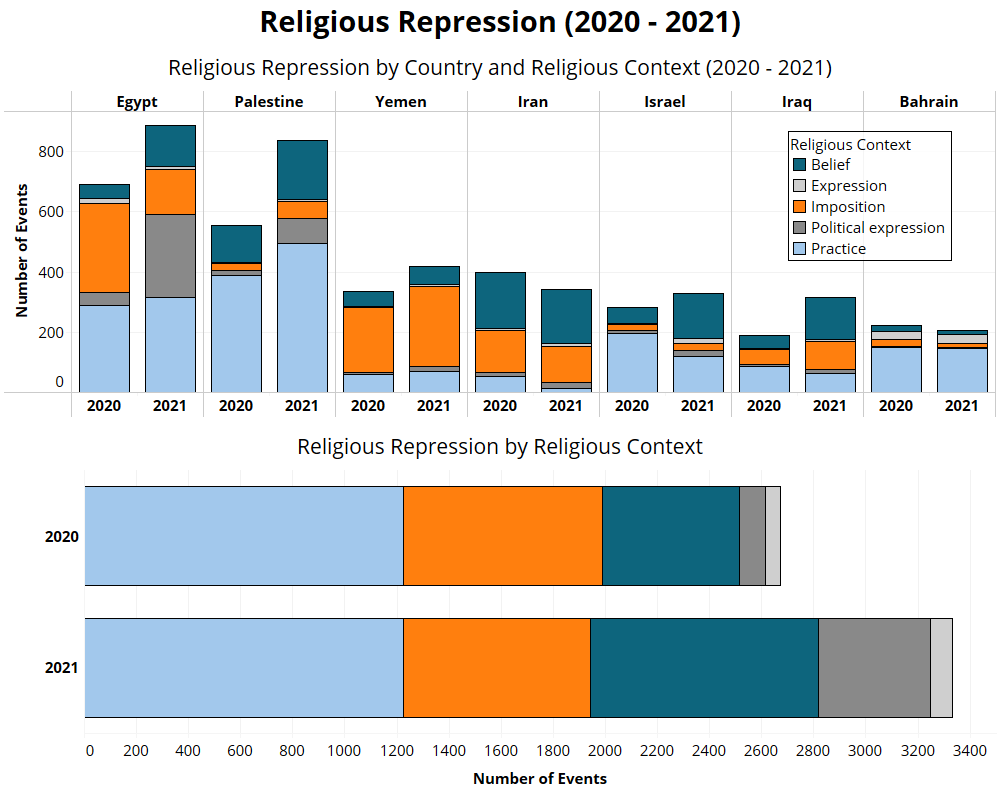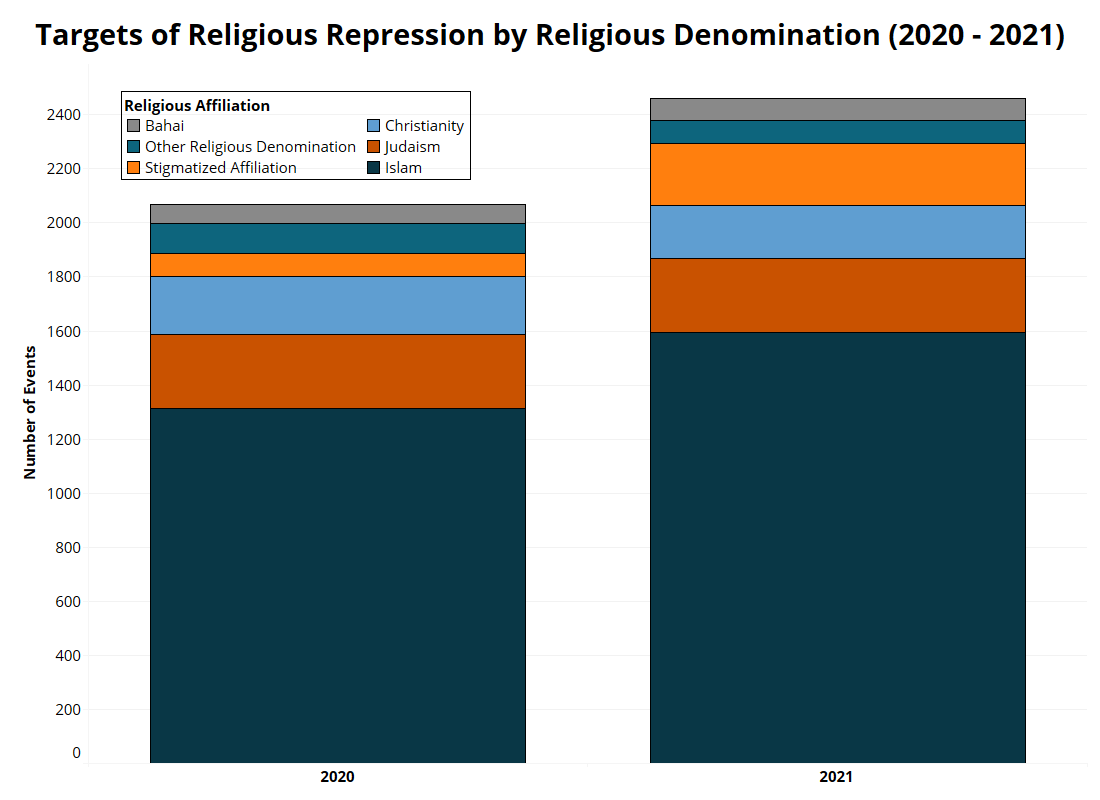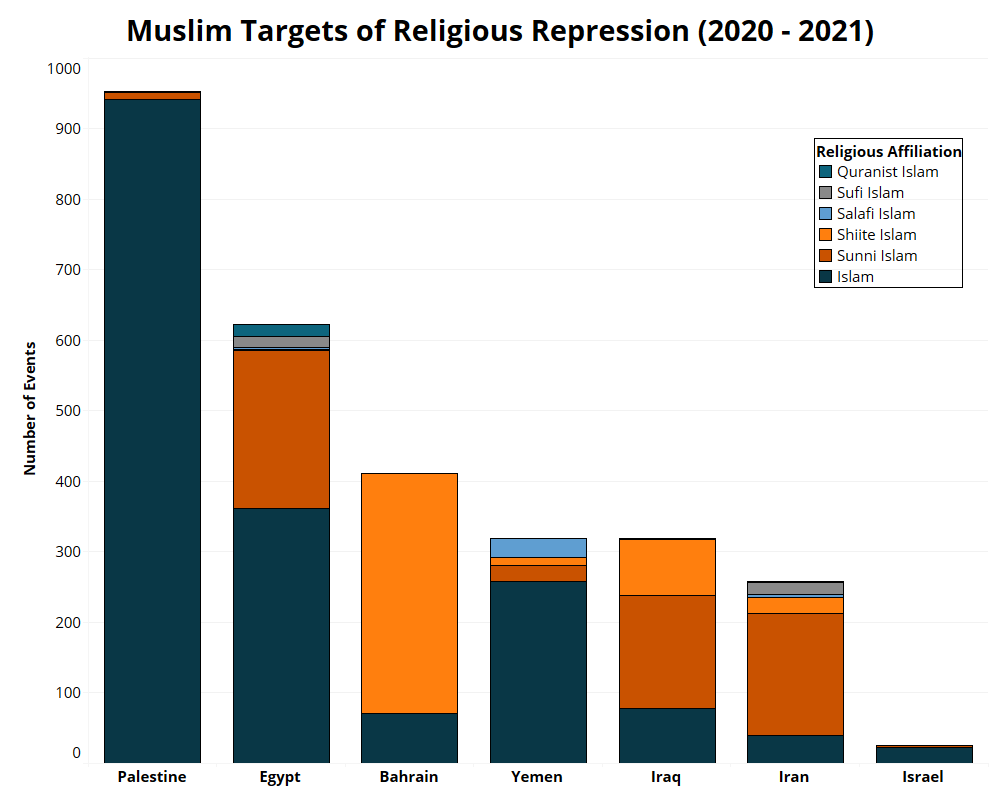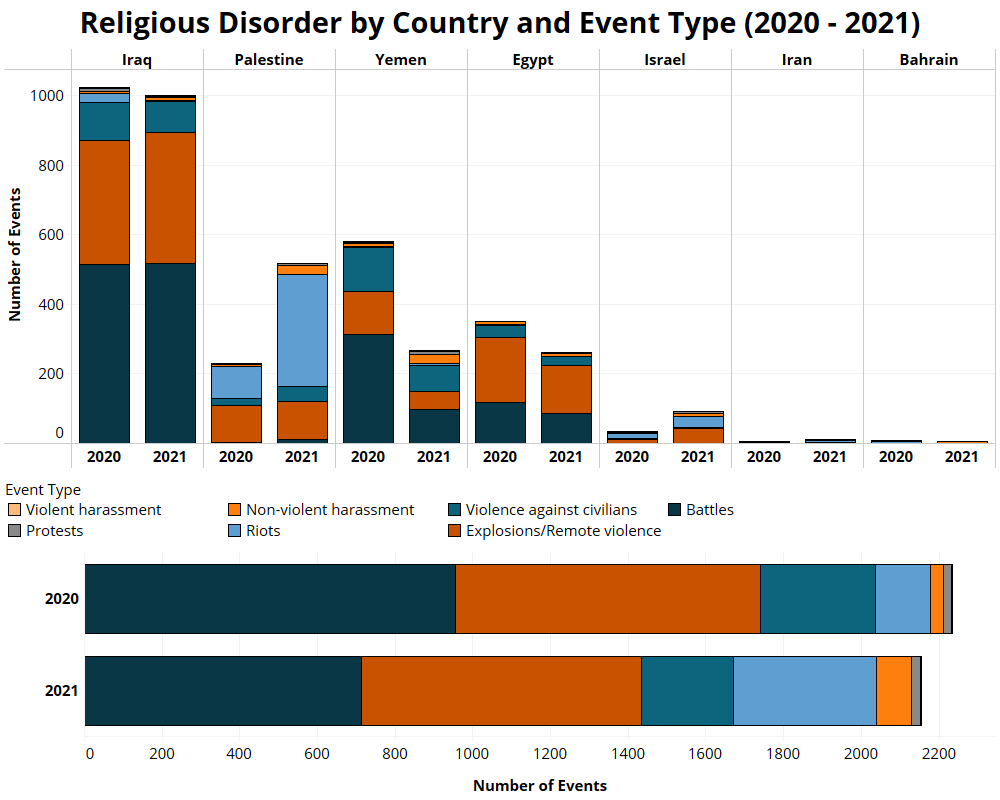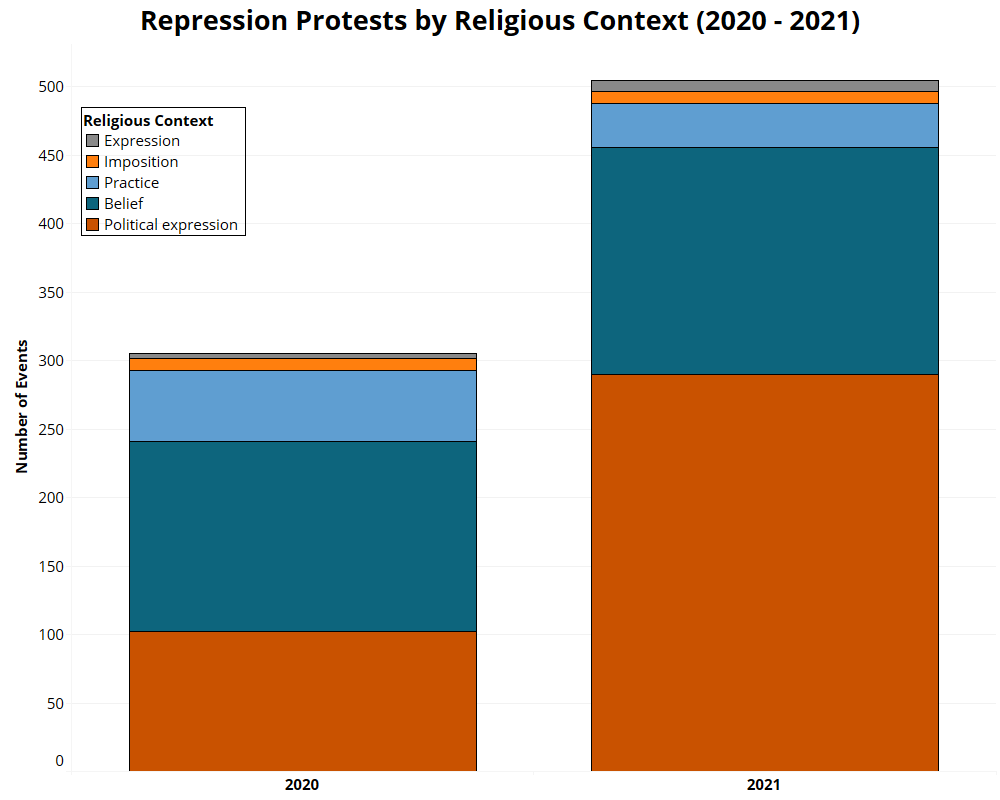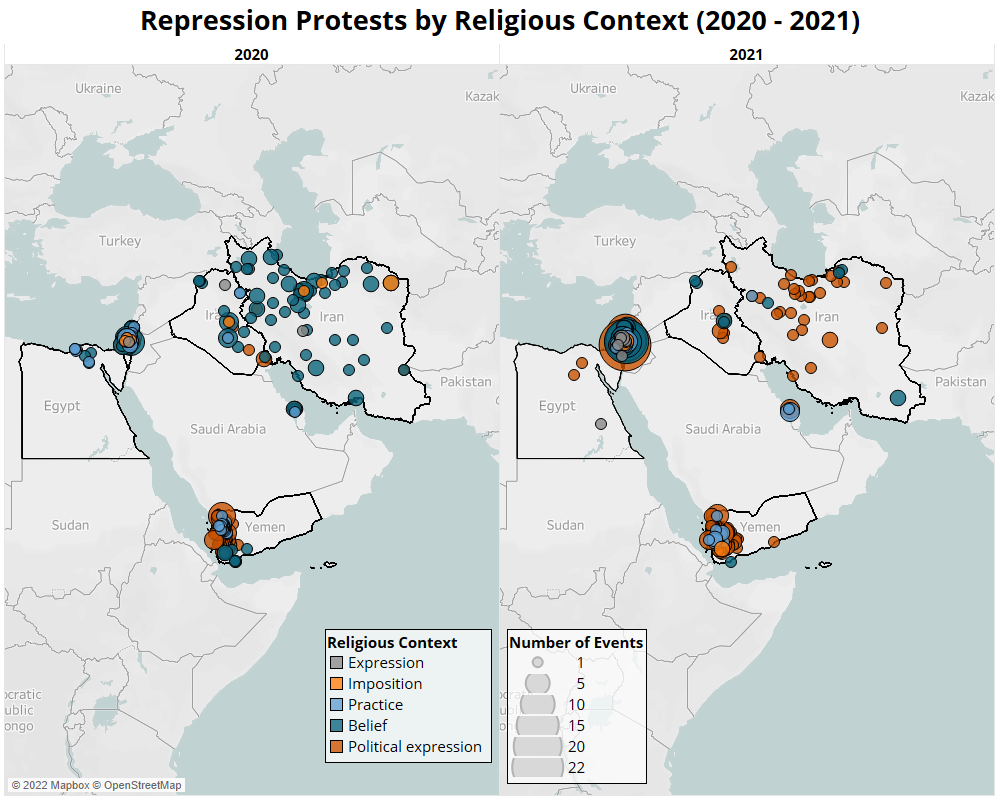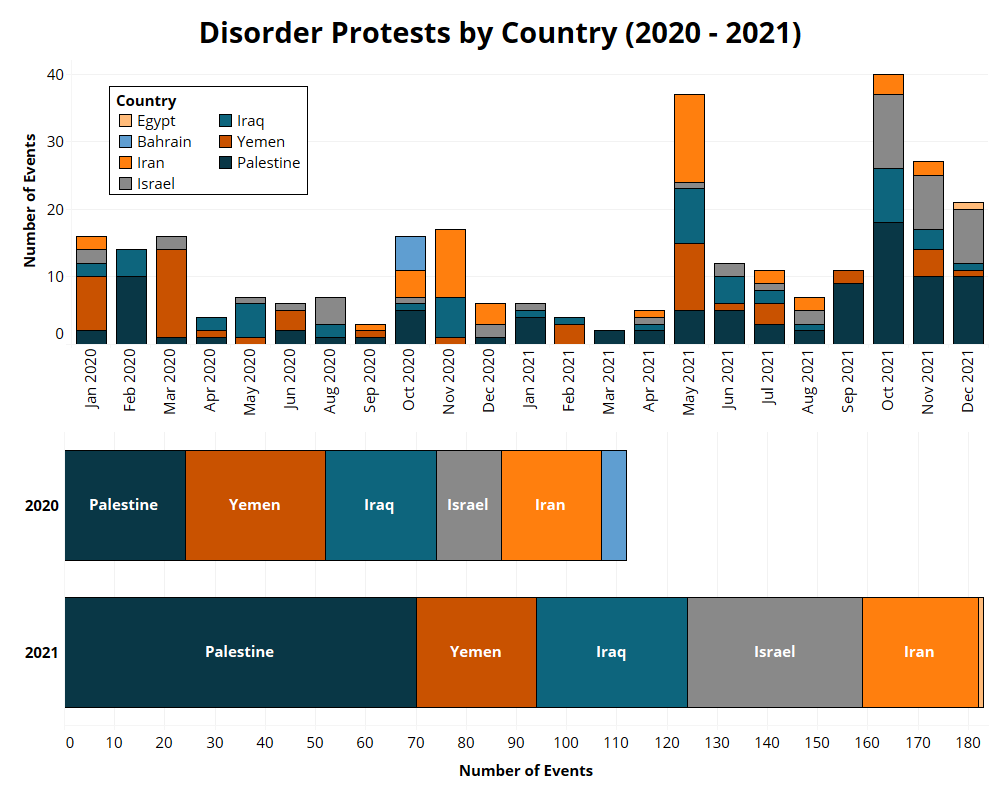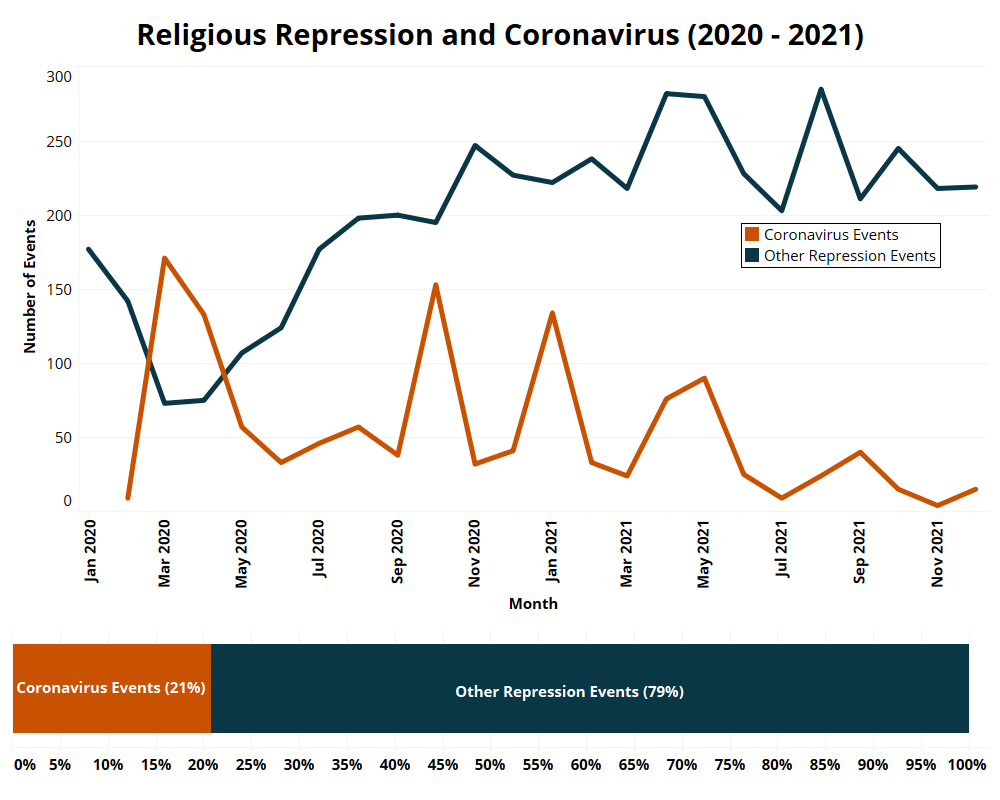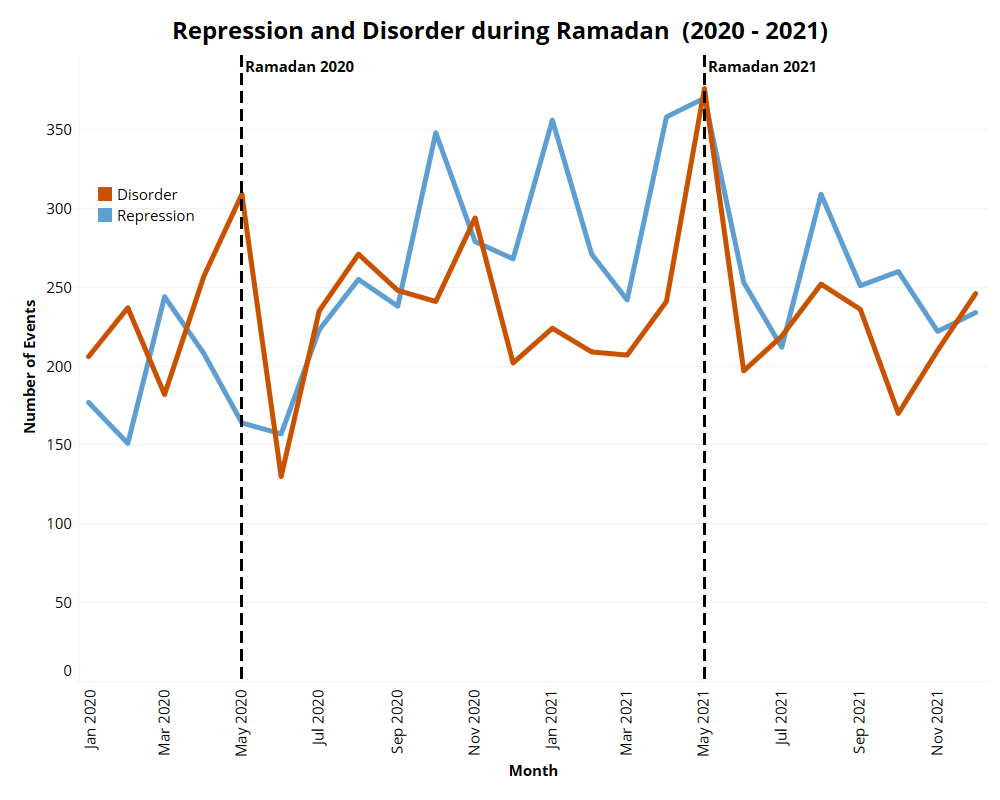ACLED-Religion’s incorporation of historical back-coding data for 2020 adds over 6,000 events across the seven countries covered by the pilot project: Bahrain, Egypt, Iran, Iraq, Israel, Palestine, and Yemen. The new data include nearly 2,400 harassment events, nearly 700 demonstration events, over 2,150 political violence events, and over 750 strategic developments. The back-coding release expands ACLED-Religion’s full dataset to nearly 13,000 total events from the beginning of 2020 to the present.
This report identifies key trends in religious disorder and repression in the seven countries covered by ACLED-Religion across 2020 and 2021. The report is organized around two sections. The first section examines overall patterns of repression and disorder, showing how macro-trends are driven by surges of events in specific countries. It also provides a focus on protest events and targets of religious repression. The second section explores potential triggers of religious repression, addressing the role of COVID-19 protocols and religious commemorations.
Patterns of Religious Repression and Disorder
This section explores macro-trends of religious repression and disorder across 2020 and 2021. Note that macro-repression trends should be interpreted with caution for several reasons: firstly, because ACLED-Religion covers a limited sample of countries; and, secondly, because macro-trends are often driven by surges of events in specific countries.
Religious Repression Patterns
In 2021, ACLED-Religion records a 23% increase in religious repression1In this report, ‘repression’ refers to all ACLED-Religion events involving a ‘religious context’ except peaceful protest events, which are discussed separately. For more on ‘religious repression,’ see the ACLED-Religion Methodology Brief and Codebook. compared to 2020. This trend was underpinned by an overall growth of repression in all countries covered by the pilot project, except Bahrain and Iran. Disaggregating repression events by ‘religious context’2ACLED-Religion categorizes repression events by five ‘religious contexts:’ practice, imposition, belief, political expression, and expression. demonstrates how general trends summarize a wide range of different repression patterns unevenly distributed across the seven countries.
The suppression of religious practice is by far the main form of repression recorded by ACLED-Religion across 2020 and 2021 (in light blue on figure below), reflected by over 2,450 events — around 41% of all captured repression. Practice repression was the dominant form of religious repression in Egypt, Bahrain, Israel, and Palestine and overall levels remained stable across the two years examined. In 2021, a slight decrease of practice repression in Bahrain, Iran, Israel, and Iraq was balanced by rises in Palestine (+27%), Yemen (+13%), and Egypt (+9%).
Religious commemorations — such as Ramadan and Ashura — and COVID-19 restrictions have been flashpoints for the repression of religious practice. More specifically, pandemic-related events accounted for around 30% of all practice events in 2020 and 19% in 2021. Notably, in Palestine, the increase in practice repression in 2021 was influenced by an uptick in events during Ramadan, with Israeli forces repressing Ramadan rituals at Al Aqsa under the pretext of enforcing COVID-19 measures (for more on this topic, see this ACLED-Religion report). In Yemen, there was an increase in Houthi state repression of Sunni Muslims, and especially Salafists, concentrated in August and October 2021. In Egypt, pandemic-related restrictions prompted a spike in practice repression during the 2021 Eid Al Fitr holidays, coinciding with the ‘Islamic wedding season’ (for more on this topic, see this ACLED-Religion report).
The imposition of religion ranks as the second most captured trend by ACLED-Religion (in orange on figure above), with over 1,480 events — around 25% of all recorded repression. These events are mostly associated with the control of public morality in Egypt, Iran, Yemen, and Iraq and they are closely linked to each regime’s attempt to impose Islamic values (for an in-depth analysis, see this ACLED-Religion report). In Egypt, imposition trends spiked following the ‘TikTok girls’ scandal – the arrest and sentencing of female social media stars for publishing allegedly ‘indecent’ videos – in April 2020 and deflated as the controversy moved out of the public spotlight. In Iran, imposition trended upwards with the establishment of new ‘Forbidding Wrong’ units to impose Islamic values between October 2020 and January 2021, only to stabilize at lower levels after the June 2021 presidential elections. In both countries, the monitoring of cyberspace has played a pivotal role in controlling public morality. In Iraq, two separate trends emerged between the end of 2020 and 2021, contributing to an 84% increase of imposition events in 2021: the suppression of leisure activities at the hand of Shiite militias from November 2020 to March 2021; and the federal government’s reinvigorated imposition of Islamic morality, targeting sexual minorities, dress-code, alcohol sale, and social media activity in late 2021. In Yemen, the imposition of Houthi sectarian ideology increased in 2021, mostly in conjunction with military advances in Marib and Shabwah.
Belief events capture the persecution of members of a religious denomination grounded on purely identitarian elements, and account for over 1,400 events (in teal on figure above) — 23% of captured repression. ACLED-Religion records a 63% increase of belief events in 2021 compared to the year prior, mostly driven by exponential growth in Iraq (up by around 221%), Egypt (204%), and Israel (185%). Belief events in Iraq mainly signal the sectarian persecution of Sunni Muslims by the mostly Shiite Iraqi federal government, a long-standing trend in the country (USCIRF, 2021). In Egypt, ACLED-Religion records this increase – associated with state targeting of Muslim Brotherhood members – since December 2020, when Al Azhar University issued a fatwa declaring that affiliation with extremist groups is “forbidden by the Shari‘a” (MEMO, 23 December 2020).3Since President Abdel Fattah Al Sisi took power in May 2014, accusations of Muslim Brotherhood membership have been used by the Egyptian regime to suppress politcal dissent (CFR, 15 August 2019). In Israel, belief events are mainly associated with the repression of Ultra-Orthodox Jews amid the enforcement of COVID-19 restrictions, and ensuing riots (for more on this topic, see this ACLED-Religion report). Although remaining stable across 2020 and 2021, belief events in Iran account for around 50% of the events in the country, mostly involving state targeting of religious minorities (for more on this topic, see this ACLED-Religion report).
Political expression events reflect the suppression of political opinions when conveyed by religious means (in dark grey on figure above). Although these events account for less than 9% of captured repression across the countries examined, they experienced an increase of +328% in 2021 when compared with 2020. This growth was mainly driven by increases in Egypt (+537%), and Palestine (+493%). ACLED-Religion records 317 political expression events in Egypt, mainly in connection with the repression of political and human rights activists accused of being Muslim Brotherhood members. While this trend preceded Al Azhar’s fatwa issued in December 2020, it reached its peak in July 2021. In Palestine, political expression events mainly take the form of riots ensuing from the use of Islamic protest prayer gatherings and the repression of religious leaders for their political opinions (for more on this topic, see this ACLED-Religion report).
The repression of religious expression is numerically the least impactful trend captured by ACLED-Religion (in light grey on figure above). Expression events account for less than 3% of all repression events, with a 9% increase in 2021 compared to the previous year. This type of repression is mainly concentrated in Bahrain around the month of Muharram, driven by the Sunni Al Khalifa regime’s crackdown on Shiite believers (for more on this topic, see this ACLED-Religion report).
Targets of Religious Repression
Across 2020 and 2021, Muslim believers encountered the highest levels of religious repression across the seven countries covered by ACLED-Religion, with over 2,900 repression events specifically targeting Muslims (see figure below). This trend increased by 21% in 2021 compared to the year prior.
Sectarianism is arguably one of the main drivers of Muslim repression, and it is particularly evident in Iraq, Iran, and Bahrain. In Iran and Iraq, Shiite majority regimes mostly targeted members of the Sunni minority, whereas the Sunni Al Khalifa regime cracked down on Shiite Muslims in Bahrain (see figure below).
Constrastingly, the Egyptian regime targeted Sunni believers in cases where they were supposedly affiliated with the Muslim Brotherhood. Notably, accusations of Muslim Brotherhood membership justified at least 166 repression events since December 2020 (coded as ‘stigmatized affiliation’). This highlights the Egyptian regime’s instrumental use of religion to curb political dissent. ACLED-Religion also records an increase of repression events targeting Quranist Muslims (+650% in Egypt), Sunni Muslims (+137% — mostly driven by an increase in Iraq and Egypt), and Salafi Muslims (+92% — mostly driven by an increase in Yemen, Iran, and Egypt) in 2021, when compared with 2020.
Judaism is the second most targeted religious denomination, accounting for 12% of all repression events, with events mostly concentrated in Iran, Israel, and Palestine. In Israel and Palestine, the COVID-19 pandemic triggered a wave of state and societal repression mostly directed against Ultra-Orthodox Jews. ACLED-Religion records a 19% increase of repression events targeting Ultra-Orthodox Jews in 2021 compared to the year prior.
The repression of Christians believers ranks third, accounting for 9% of all repression events, and is concentrated in Egypt, Iran, Iraq, and Yemen (see figure below). Whereas state forces were the main perpetrators in Yemen, Iraq, and Iran, repression mostly took place at the societal level in Egypt.
Baha’i repression in Iran remains of particular concern, given the high number of repression events recorded by ACLED-Religion (over 150) compared to the small size of the Iranian Baha’i community — estimated to number around 350,000 individuals (United Nations, 18 July 2019). In 2021, state repression of the Baha’i minority in Iran increased by 19% and was mostly perpetrated through ‘judicial harassment,’ ‘discrimination,’ and ‘raids’ events.
Religious Disorder Patterns
Religious disorder4In this report, ‘disorder’ refers to all ACLED-Religion events with no ‘religious context’ and yet involving a religion-based actor except peaceful protest events, which are discussed separately. For more on ‘religious disorder,’ see the ACLED-Religion Methodology Brief and Codebook. in 2021 remained at roughly the same levels of 2020. However, ACLED-Religion records significant changes related to the patterns, geographical distribution, and lethality of disorder events.
Across 2020 and 2021, disorder levels remained stable across the countries covered by the pilot project in spite of an overall increase of riots (+162%) and non-violent harassment events (+162%) involving religion-based actors in 2021. ACLED-Religion records the highest levels of religious disorder in Iraq, followed by Yemen, Palestine, and Egypt (see figure below). In Iraq, disorder remained stable across the two years, despite a significant increase in militia activity in 2021 (+22%), due to lower levels of riots, violence against civilians, and violent demonstrations. In Yemen, Houthi activity remained stable across 2020 and 2021, whereas Islah and Al Qaeda in the Arabian Peninsula (AQAP) activity somewhat decreased in 2021. Concurrently, the Islamic State (IS) almost ceased its operations in the country in 2021. Similarly, in Egypt, IS was involved in a lower number of events in 2021, leading to an overall decrease of religious disorder in the country. Whereas levels of disorder decreased in Yemen and Egypt in 2021, ACLED-Religion records a large increase in Israel and Palestine, especially during April and May 2021. This uptick was mainly driven by riot events (in light blue on figure below).
This change in violence patterns is reflected by the lessened lethality of religious disorder in 2021 compared to 2020. ACLED-Religion data indicate that religious disorder was linked to nearly 3,050 reported fatalities in 2020 and nearly 2,090 in 2021, a decrease of 31%. This trend was driven by a general decrease of fatalities in Iran, Egypt, and Yemen, whereas Israel and Palestine witnessed an exponential rise due to the May 2021 conflict between Hamas and Israeli forces.
Protest Events Involving a Religious Context
In 2021, ACLED-Religion records a 66% increase in the number of protest events involving a ‘religious context’ (‘repression protests’) compared to the previous year. This growth is mainly driven by an upward trend of protest events characterized by the political expression of religion, which saw a 184% increase in 2021 compared to the previous year (in brown on figure below).
Across 2020 and 2021, most ‘political expression’ protest events are captured in Palestine and Yemen (see map below). In Palestine, two main trends emerged. The first is the continuous use of peaceful contestation prayers, also adopted to protest in solidarity with Palestinian prisoners escaped from Gilboa prison (September and October 2021) (for more, see this ACLED-Religion report and ACLED-Religion Weekly Overview). The second trend pertains to an escalation of protest events related to the Shaykh Jarrah evictions and Al Aqsa incidents in Ramadan from April to May 2021. In Yemen, upticks in ‘political expression’ protest events are recorded across 2020 and 2021 in relation to Quds Day protests and Ashura and Mawlid Nabawi commemorations. Contrastingly, in Iran, Quds Day protests were officially called off in 2020 (Times of Israel, 5 May 2020), yet took place in 30 different locations in 2021.
While the level of protest events focused on religious belief remained stable across the two years covered, the geographical distribution is different. In 2020, most belief protest events took place in Iran. An uptick was recorded in relation to the reprinting of the Charlie Hebdo cartoons representing the Prophet Muhammad in September 2020 (The New York Times, 1 September 2020), and the subsequent statements released by French President Emmanuel Macron in October (The Guardian, 26 October 2020). The latter event triggered protests in all seven countries covered by ACLED-Religion. In contrast, most belief events in 2021 took place in Israel and Palestine, in relation to the desecration of Islamic holy sites such as Al Aqsa Mosque in May and June 2021 and the Youssoufiya cemetery in October 2021 (for more on this topic, see this ACLED-Religion Weekly Overview).
Protest Events Involving Religion-based Actors
Protest events involving religion-based actors (‘disorder protests’) account for around 27% of the protest events captured by ACLED-Religion, growing in 2021 by 63% compared to the year prior (see figure below). This surge in disorder protests was both directly and indirectly driven by events in Israel and Palestine. The conflict between Hamas and Israeli forces in May 2021 triggered massive protests in solidarity with the Palestinian people, organized by religious leaders in Iran, Shiite movements in Iraq, and the Houthi movement in Yemen. In addition, both Israel and Palestine witnessed a hot autumn of protests. Between October and December 2021, ACLED-Religion records an increase in protest events involving Zionist and right-wing groups in Israel. Concurrently, in Palestine, the Islamist groups Hamas and Palestinian Islamic Jihad participated in several protests events. These protests were held in relation to the Gilboa prison jailbreak in September and October 2021 and the Balfour declaration anniversary in November 2021, with demonstrators also demanding that Israeli authorities release the bodies of killed Palestinians.
Notably, just one disorder protest was recorded in Egypt across 2020 and 2021, and five were captured in Bahrain. These two countries also registered the lowest level of repression protests captured by ACLED-Religion among the countries examined. Arguably, this low level of activity by religion-based actors is a consequence of the systematic repression of political dissent in these two countries (Freedom House, 2021; Freedom House, 2021).
Triggers of Repression and Disorder
This section explores potential triggers of repression and disorder across 2020 and 2021, with a specific focus on COVID-19 protocols and Islamic religious commemorations. Like the above analysis of macro-repression trends, the correlation between these triggers and potential spikes of events should be interpreted with caution, as religious repression and disorder are always the outcome of complex configurations of political and religious environments.
COVID-19 Protocols
As the COVID-19 pandemic spread across the globe, state and religious authorities issued restrictive measures aimed at curbing the rate of virus transmission. These measures significantly impacted religious practice across the seven countries covered by ACLED-Religion. Across 2020 and 2021, ACLED-Religion captures over 1,295 repression events directly related to COVID-19, accounting for around 21% of all recorded repression (see figure below). Overall, the level of pandemic-related religious repression in 2021 decreased by 40% from 2020 (see figure below), reflecting a significant reduction of restrictions in all countries except Egypt and Bahrain.
Although authorities decreed public health measures in all countries examined, the enforcement of these restrictions was far from homogeneous. ACLED-Religion data highlight two main patterns of religious repression related to how COVID-19 measures were enforced5Whereas the establishment of COVID-19 restrictions is coded with the ‘change to religion law/policy’ sub-event type, the enforcement of these measures is coded with other non-violent and violent harassment sub-event types, mostly ‘prevention of practice’ and ‘judicial harassment.’ by different state and religious authorities. The first pattern entails a low level of enforcement of state-decreed COVID-19 restrictions, resulting in low levels of religious repression. This pattern is characteristic of Iraq, Iran, and Yemen. In Iraq, state authorities – supported by the Shiite religious establishment and their armed militias (Ardemagni, 7 May 2020) – systematically resorted to legal means in order to limit religious practice and curb the spread of COVID-19. This especially coincided with major religious events, such as Ramadan and Ashura. However, legal provisions were hardly translated into practice, as demonstrated by the negligible number of ‘prevention of practice’ events recorded by ACLED-Religion despite massive participation in religious rituals (for more on this topic in relation to Ashura, see this ACLED-Religion report).
In Iran, the regime initially downplayed the seriousness of the pandemic (USIP, 1 June 2021). Partial lockdowns involving places of worship were decreed in March 2020 and followed around October 2020 by new restrictive measures, as the regime declared COVID-19 Iran’s “number-one problem” (Reuters, 11 August 2021). In 2021, despite the high number of COVID-19 cases and slow pace of the vaccination campaign (Reuters, 11 August 2021), only one ‘change to religion law/policy’ event focused on COVID-19 was recorded in Iran. Overall, the enforcement of these measures – reflected by several ‘judicial harassment,’ ‘discrimination,’ and ‘prevention of practice’ events – was negligible across the two years. In Yemen, ACLED-Religion shows that both the Hadi government and the Houthis decreed restrictions on religious practice between March and June 2020, with a specific focus on Ramadan-related practice. However, these measures were hardly enforced. Furthermore, in 2021, both governments — for different reasons (ACAPS, 10 January 2022) –– avoided issuing new preventive measures.
The second pattern reflects a massive enforcement of state-decreed COVID-19 restrictions, resulting in a high level of repression events, yet ‘selectively’ targeting specific sectors of the population. This pattern is evident in Egypt, Bahrain, Israel, and Palestine. In Egypt, ACLED-Religion records the highest number of pandemic-related repression events (over 485), slightly increasing in 2021 from 2020. State repression mostly focused on Muslim practice and peaked in March 2020 at the onset of the pandemic, during the third COVID-19 wave in January 2021, and during Ramadan 2021. Notably, Christian religious authorities self-administered the shut down of places of worship, which resulted in preemptive closures and very few ‘prevention of practice’ events (for more on this topic, see this ACLED-Religion report). In Bahrain, the regime selectively applied COVID-19 restrictions to the Shiite population, leading to peaks of repression during Islamic commemorations reflected by a spike in ‘prevention of practice’ and ‘judicial harassment’ events.
In all countries examined above, most repression events reflected state enforcement of COVID-19 protocols. However, in Israel and Palestine, the imposition of public health measures also triggered significant riot events. In Israel, COVID-19 protocols positioned ultra-Orthodox Jewish communities against state authorities, as the former refused to comply with public health restrictions and social distancing measures (for more on this topic, see this ACLED-Religion report). The suppression of Jewish ritual activity and the shut down of religious institutes triggered around 58 mob violence events related to the pandemic, mostly concentrated in April and October 2020, and during the second COVID-19 wave in January 2021. Similarly, Muslim ritual practice was suppressed in Palestine by Israeli authorities, with peaks of violence recorded around January and Ramadan 2021.
Religious Commemorations
Religious commemorations are potential catalysts for state abuses and minority contestation (Hintz & Quatrini, 2020). ACLED-Religion data show how different politico-historical circumstances have influenced levels of repression during Ramadan and ‘Ashura season’6In this report, the period between the beginning of Muharram and Arbaeen (9 August – 27 September) is referred to as ‘Ashura season.’ across 2020 and 2021.
In 2020, ACLED-Religion captures repression events focused on Ramadan-related7Ramadan-related religious practice is determined based on an explicit reference to the suppression of Ramadan rites (e.g. tarawih, iftar, etc.) or to the enforcement of norms and regulations specifically decreed for the month of Ramadan. The estimate is conservative, since sources may not explicitly mention the connection between a given repression event and Ramadan-related religious practice. practice in all seven countries covered by the pilot project. In all countries, the suppression of ritual practice was mainly justified by COVID-19 protocols, while the imposition of Ramadan-related ritual practice (such as fasting) was only recorded in Iran. Overall, the impact of Ramadan-related repression in 2020 was negligible and religious repression signaled a 20% decrease during the Islamic holy month compared to the month prior.
Contrastingly, during Ramadan 2021, ACLED-Religion records a 52% increase of religious repression, with an escalation of Muslim practice repression in five of the seven countries covered. In Yemen, Houthi authorities engaged in the sectarian repression of Ramadan-related Sunni practice. In Bahrain, Egypt, and Iraq, COVID-19 restrictions played a major role in limiting religious practice. Lastly, in Palestine, multiple factors contributed to the ignition of a cycle of violence: the enforcement of COVID-19 restrictions; the co-occurrence of Jewish and Islamic religious events; and the politicization of religious practice (for more on this topic, see this ACLED-Religion report).
Notably, both in 2020 and 2021, religious disorder reached its highest yearly peak during Ramadan (see figure below). In 2020, ACLED-Religion records a 51% increase of religious disorder in Ramadan compared to the month prior. This trend was mainly underpinned by a surge in IS activity in Iraq, with no apparent connection with broader repression patterns. Contrastingly, in 2021, religious disorder increased by 60%, driven by the escalation of conflict between Hamas and Israeli forces in Palestine and Israel. In this case, the repression of Ramadan-related practice in Palestine played a pivotal role in triggering disorder events, exacerbating tensions that later exploded into overt conflict.
In relation to Ashura season, ACLED-Religion records Ashura-related8Ashura-related religious practice is determined based on explicit references to the suppression of Muharram, Ashura, and Arbaeen rites, or to the enforcement of norms and regulations specifically decreed for Ashura season. The estimate of Ashura-related events is conservative, since sources may not explicitly mention the connection between a given repression event and Ashura-related religious rituals. repression events in four countries characterized by the presence of a large Shiite population: Bahrain, Iran, Iraq, and Yemen (for an in-depth analysis of these trends in 2021, see this ACLED-Religion report). Repression followed different patterns in 2020 and 2021, and across countries. In 2020, the Iranian regime selectively shut down several shrines in relation to COVID-19 restrictions, with minor consequences for Ashura commemorations. However, in 2021, no major limitations on ritual practice are recorded. Both in 2020 and 2021, Bahraini and Iraqi authorities decreed COVID-19 restrictions limiting Ashura ritual practice prior to Muharram. Whereas Iraqi authorities did not enforce the restrictions, the Sunni Al Khalifa regime in Bahrain systematically cracked down on the Shiite population. In Yemen, Houthi authorities endeavored to impose Ashura commemorations on the general population in 2020, while adopting a more moderate approach in 2021. As for religious disorder, no major correlations are apparent in relation to Ashura season.
Conclusion
When compared with 2020, ACLED-Religion records an overall increase of religious repression in all countries examined in 2021, except Bahrain and Iran. This upward trend is underpinned by a surge in the number of belief, political expression, and expression events in 2021. The repression of religious practice remained stable in 2020 and 2021 and, across both years, it accounted for the relative majority of repression events. Contrastingly, imposition events slightly decreased in 2021.
Muslim believers encountered the highest levels of religious repression across all countries covered by ACLED-Religion. This trend increased in 2021, reflecting a growth in repression events targeting Quranist, Sunni, and Salafi Muslims. Judaism and Christianity were the second and third most targeted denominations across 2020 and 2021. While the repression of Christians trended downwards in 2021, repression targeting Judaism slightly increased due to a rise in state and societal repression of Ultra-Orthodox Jews in Israel. Baha’i repression — although mostly concentrated in Iran — also remained alarmingly high and increased in 2021 compared with the year prior.
Levels of religious disorder remained relatively stable across 2020 and 2021. However, ACLED-Religion data show that the patterns, geographical distribution, and lethality of disorder events significantly changed in 2021. In particular, an overall increase of riots and non-violent harassment events — combined with a reduction of political violence events — accounted for a decline in the lethality of religious disorder in 2021.
Surges in repression protests across 2020 and 2021 were mainly driven by a few landmark events that prompted demonstrations across the Middle East and North Africa region. In the fall of 2020, the reprinting of the controversial Charlie Hebdo cartoons triggered a wave of protests across all countries covered by ACLED-Religion. Similarly, the May 2021 incidents in Palestine and the subsequent conflict between Hamas and Israeli forces triggered a surge in repression and disorder protests in all countries, except Egypt and Bahrain.
ACLED-Religion data show that COVID-19 protocols played a major role in the repression of religious practice across 2020 and 2021. However, the enforcement of COVID-19 restrictions varied across the countries examined. In Iraq, Iran, and Yemen, a low level of enforcement resulted in low levels of religious repression. Contrastingly, in Egypt, Bahrain, Israel, and Palestine, massive enforcement of state-decreed COVID-19 restrictions resulted in a high level of repression events ‘selectively’ targeting specific sectors of the population. Similarly, the impact of religious commemorations depended on the configuration of each country’s specific political and religious environment. Repression spiked during Ramadan 2021 due to the incidents recorded in Israel and Palestine. Ashura season, on the other hand, mainly affected Iran, Bahrain, Iraq, and Yemen — countries characterized by the presence of a large Shiite population.
Download the pilot data and learn more about the methodology on our ACLED-Religion project page.
While this report is based on data collected as part of a program funded by the US Department of State’s Bureau of Conflict and Stabilization Operations, this report is not part of that program. The views expressed in this report are solely those of the authors and do not necessarily reflect the views or policies of the United States Government.
 © 2022 Armed Conflict Location & Event Data Project (ACLED). All rights reserved.
© 2022 Armed Conflict Location & Event Data Project (ACLED). All rights reserved.

